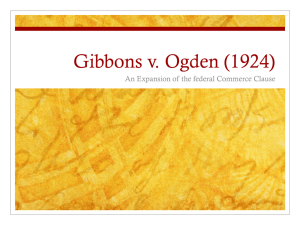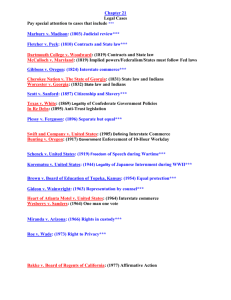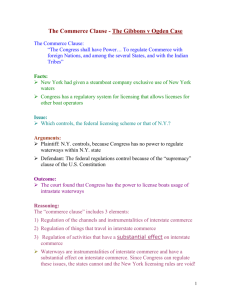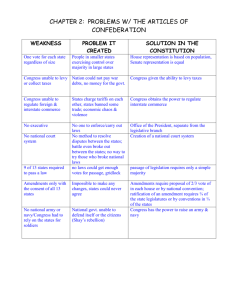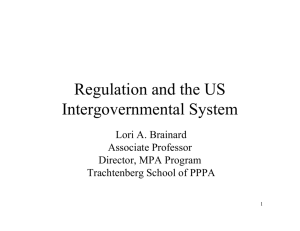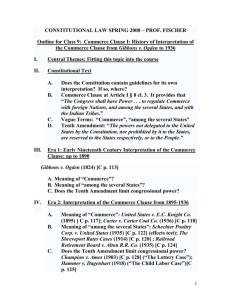expansion of central government powers
advertisement
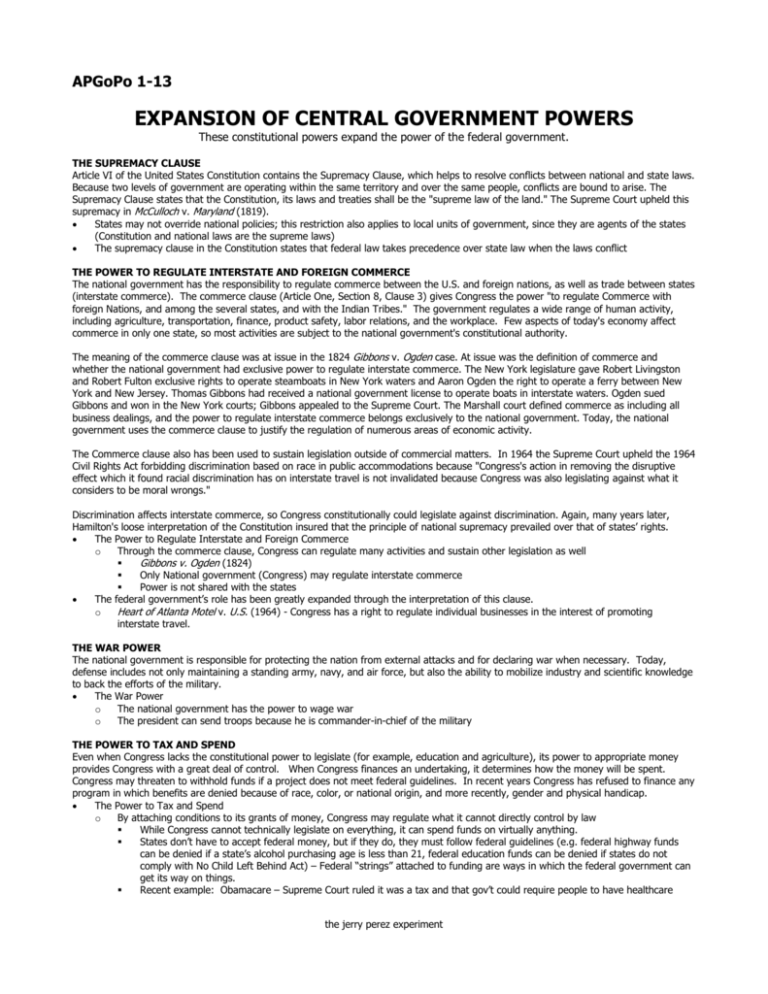
APGoPo 1-13 EXPANSION OF CENTRAL GOVERNMENT POWERS These constitutional powers expand the power of the federal government. THE SUPREMACY CLAUSE Article VI of the United States Constitution contains the Supremacy Clause, which helps to resolve conflicts between national and state laws. Because two levels of government are operating within the same territory and over the same people, conflicts are bound to arise. The Supremacy Clause states that the Constitution, its laws and treaties shall be the "supreme law of the land." The Supreme Court upheld this supremacy in McCulloch v. Maryland (1819). States may not override national policies; this restriction also applies to local units of government, since they are agents of the states (Constitution and national laws are the supreme laws) The supremacy clause in the Constitution states that federal law takes precedence over state law when the laws conflict THE POWER TO REGULATE INTERSTATE AND FOREIGN COMMERCE The national government has the responsibility to regulate commerce between the U.S. and foreign nations, as well as trade between states (interstate commerce). The commerce clause (Article One, Section 8, Clause 3) gives Congress the power "to regulate Commerce with foreign Nations, and among the several states, and with the Indian Tribes." The government regulates a wide range of human activity, including agriculture, transportation, finance, product safety, labor relations, and the workplace. Few aspects of today's economy affect commerce in only one state, so most activities are subject to the national government's constitutional authority. The meaning of the commerce clause was at issue in the 1824 Gibbons v. Ogden case. At issue was the definition of commerce and whether the national government had exclusive power to regulate interstate commerce. The New York legislature gave Robert Livingston and Robert Fulton exclusive rights to operate steamboats in New York waters and Aaron Ogden the right to operate a ferry between New York and New Jersey. Thomas Gibbons had received a national government license to operate boats in interstate waters. Ogden sued Gibbons and won in the New York courts; Gibbons appealed to the Supreme Court. The Marshall court defined commerce as including all business dealings, and the power to regulate interstate commerce belongs exclusively to the national government. Today, the national government uses the commerce clause to justify the regulation of numerous areas of economic activity. The Commerce clause also has been used to sustain legislation outside of commercial matters. In 1964 the Supreme Court upheld the 1964 Civil Rights Act forbidding discrimination based on race in public accommodations because "Congress's action in removing the disruptive effect which it found racial discrimination has on interstate travel is not invalidated because Congress was also legislating against what it considers to be moral wrongs." Discrimination affects interstate commerce, so Congress constitutionally could legislate against discrimination. Again, many years later, Hamilton's loose interpretation of the Constitution insured that the principle of national supremacy prevailed over that of states’ rights. The Power to Regulate Interstate and Foreign Commerce o Through the commerce clause, Congress can regulate many activities and sustain other legislation as well Gibbons v. Ogden (1824) Only National government (Congress) may regulate interstate commerce Power is not shared with the states The federal government’s role has been greatly expanded through the interpretation of this clause. o Heart of Atlanta Motel v. U.S. (1964) - Congress has a right to regulate individual businesses in the interest of promoting interstate travel. THE WAR POWER The national government is responsible for protecting the nation from external attacks and for declaring war when necessary. Today, defense includes not only maintaining a standing army, navy, and air force, but also the ability to mobilize industry and scientific knowledge to back the efforts of the military. The War Power o The national government has the power to wage war o The president can send troops because he is commander-in-chief of the military THE POWER TO TAX AND SPEND Even when Congress lacks the constitutional power to legislate (for example, education and agriculture), its power to appropriate money provides Congress with a great deal of control. When Congress finances an undertaking, it determines how the money will be spent. Congress may threaten to withhold funds if a project does not meet federal guidelines. In recent years Congress has refused to finance any program in which benefits are denied because of race, color, or national origin, and more recently, gender and physical handicap. The Power to Tax and Spend o By attaching conditions to its grants of money, Congress may regulate what it cannot directly control by law While Congress cannot technically legislate on everything, it can spend funds on virtually anything. States don’t have to accept federal money, but if they do, they must follow federal guidelines (e.g. federal highway funds can be denied if a state’s alcohol purchasing age is less than 21, federal education funds can be denied if states do not comply with No Child Left Behind Act) – Federal “strings” attached to funding are ways in which the federal government can get its way on things. Recent example: Obamacare – Supreme Court ruled it was a tax and that gov’t could require people to have healthcare the jerry perez experiment

